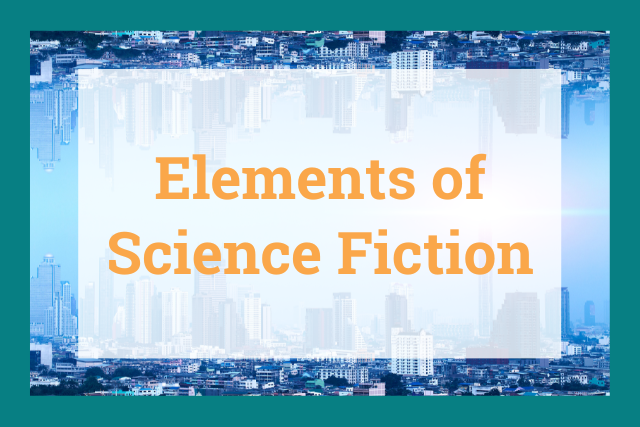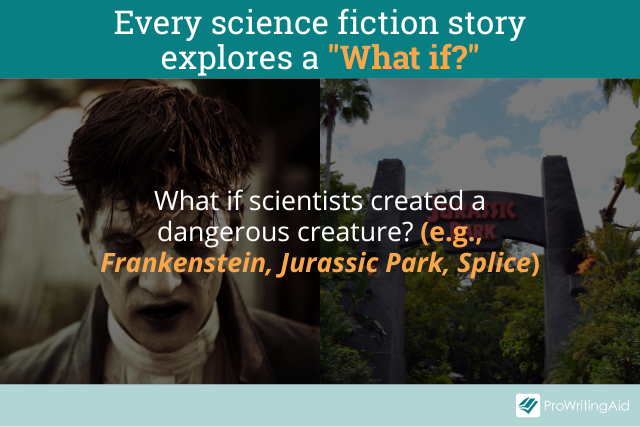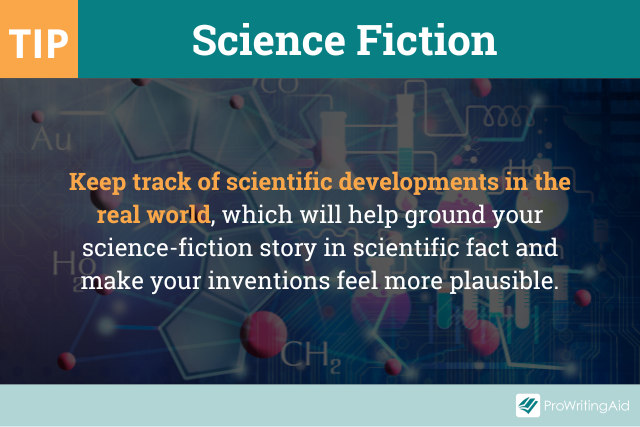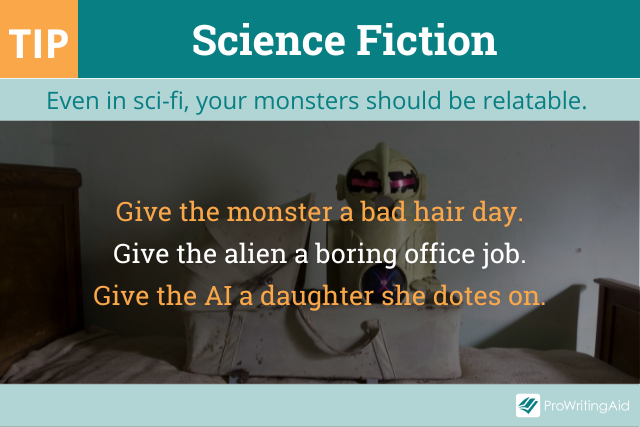
The science fiction genre can be overwhelming at times—it’s full of so many strange worlds, futuristic concepts, and deep themes.
So which elements are most important for the genre?
Read on to learn about the five key elements of science fiction.
The 5 Elements of Science Fiction
Let’s take a closer look at the five characteristics of science fiction that every writer needs to know.
1. “What If?”
Every great science fiction novel explores a “what if” question, which is a hypothetical question that ignites your imagination.
Some examples of “what if”s you can explore include:
- What if scientists created a dangerous creature? (e.g. Frankenstein, Jurassic Park, Splice)
- What if aliens landed on Earth? (e.g. E.T., Story of Your Life, Contact)
- What if a human fell in love with an AI? (e.g. Her, Ex Machina, Do Androids Dream of Electric Sheep?)

Each of these questions has been explored in countless different books and movies, but each author answers it in a unique way.
Your “what if” question doesn’t have to be something that nobody’s ever thought of before, as long as your answer is original.
2. An Unfamiliar Setting
World building is an exciting component of writing a science fiction story. You can set your sci-fi novels in an alternate time, an alternate place, or both.
If you want to choose an alternate time, you could use a real place on Earth as a starting point, such as Seattle, Paris, or Beijing, and then imagine what that place would be like in a different past or an imaginary future.
If you opt for an alternate place, you might choose a terraformed planet in outer space. Or a floating city, full of flying cars and futuristic concepts. Or even a virtual world in cyberspace, where anything can happen.
People love stories with memorable settings and science fiction is a great genre for building exciting fictional worlds.
3. Innovative Technology
Many science fiction stories include speculative technology that readers have never imagined before.
If you’re writing present-day, alternate history, or near-future science fiction, you might want to take forms of advanced technology that we already have today and push them to the extreme.
For example, the TV show Black Mirror often deals with social media in new ways.
Stories set in stranger worlds might have even more far-fetched technology. For example, your story might have a time machine that can send people into the past, a sentient rocket ship for space travel, or a high-energy weapon for interplanetary warfare.

Keep track of scientific developments in the real world, which will help ground your story in scientific fact and make your inventions feel more plausible.
4. Relatable Characters
Creating relatable, three-dimensional characters is more than just one of the science fiction characteristics—it’s the key to any good story.
However, science fiction is unique because not all characters have to be humans. Many sci-fi protagonists are aliens, robots, or something else entirely.
The key is to make the characters relatable to the reader. Give the monster a bad hair day; give the alien a boring office job; give the robot a daughter she dotes on.

If you develop characters that people can relate to, you’ll be able to hook your reader into the story.
5. Themes About Humanity
A great science fiction story can show us what it means to be human.
Each subgenre of science fiction literature is ripe for exploring different themes.
Apocalyptic stories, such as The Stand, show the dark side of human nature and the things people will do to survive.
Alien stories, such as Star Wars, show fear of the “other” and a greater sense of humankind’s place in the universe.
Dystopian stories, such as Brave New World, show the importance of personal freedom and how government control can be dangerous.
Experiment with the elements in your own story to see what themes emerge.
What You Should Know About the Characteristics of Science Fiction
If you’re writing a science fiction novel, remember that science fiction literary conventions are a great starting point, but they’re not the finish line.
You can combine these science fiction characteristics in new ways. Think of them as a recipe, with each element being another ingredient you can play with.
The more you read the work of other science fiction writers, the better you’ll understand what’s been done before.
Pay attention to how each of these five elements appear in your favorite stories and try to create something original of your own.
If you want to learn firsthand from successful science fiction writers, don’t forget to register for our free Science Fiction Writers’ Week!

